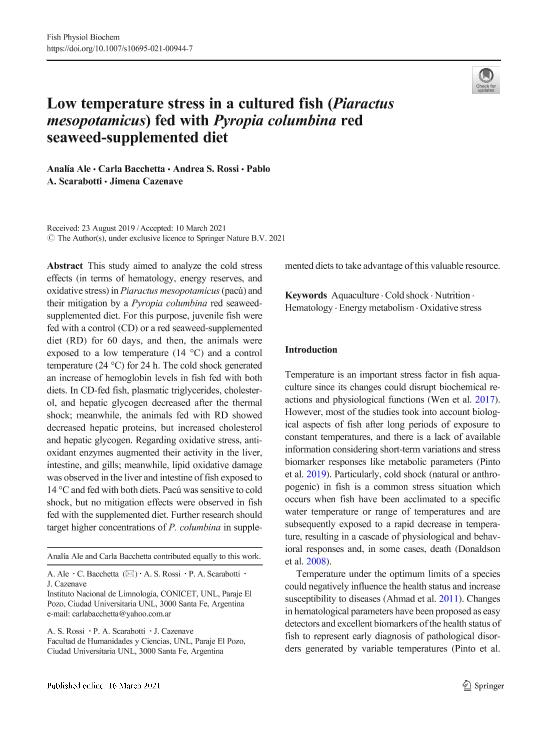Artículo
Low temperature stress in a cultured fish (Piaractus mesopotamicus) fed with Pyropia columbina red seaweed-supplemented diet
Ale, Analía ; Bacchetta, Carla
; Bacchetta, Carla ; Rossi, Andrea Silvana
; Rossi, Andrea Silvana ; Scarabotti, Pablo Augusto
; Scarabotti, Pablo Augusto ; Cazenave, Jimena
; Cazenave, Jimena
 ; Bacchetta, Carla
; Bacchetta, Carla ; Rossi, Andrea Silvana
; Rossi, Andrea Silvana ; Scarabotti, Pablo Augusto
; Scarabotti, Pablo Augusto ; Cazenave, Jimena
; Cazenave, Jimena
Fecha de publicación:
08/2021
Editorial:
Springer
Revista:
Fish Physiology and Biochemistry
ISSN:
0920-1742
Idioma:
Inglés
Tipo de recurso:
Artículo publicado
Clasificación temática:
Resumen
This study aimed to analyze the cold stress effects (in terms of hematology, energy reserves, and oxidative stress) in Piaractus mesopotamicus (pacú) and their mitigation by a Pyropia columbina red seaweed-supplemented diet. For this purpose, juvenile fish were fed with a control (CD) or a red seaweed-supplemented diet (RD) for 60 days, and then, the animals were exposed to a low temperature (14 °C) and a control temperature (24 °C) for 24 h. The cold shock generated an increase of hemoglobin levels in fish fed with both diets. In CD-fed fish, plasmatic triglycerides, cholesterol, and hepatic glycogen decreased after the thermal shock; meanwhile, the animals fed with RD showed decreased hepatic proteins, but increased cholesterol and hepatic glycogen. Regarding oxidative stress, antioxidant enzymes augmented their activity in the liver, intestine, and gills; meanwhile, lipid oxidative damage was observed in the liver and intestine of fish exposed to 14 °C and fed with both diets. Pacú was sensitive to cold shock, but no mitigation effects were observed in fish fed with the supplemented diet. Further research should target higher concentrations of P. columbina in supplemented diets to take advantage of this valuable resource.
Palabras clave:
AQUACULTURE
,
COLD SHOCK
,
ENERGY METABOLISM
,
HEMATOLOGY
,
NUTRITION
,
OXIDATIVE STRESS
Archivos asociados
Licencia
Identificadores
Colecciones
Articulos(INALI)
Articulos de INST.NAC.DE LIMNOLOGIA (I)
Articulos de INST.NAC.DE LIMNOLOGIA (I)
Citación
Ale, Analía; Bacchetta, Carla; Rossi, Andrea Silvana; Scarabotti, Pablo Augusto; Cazenave, Jimena; Low temperature stress in a cultured fish (Piaractus mesopotamicus) fed with Pyropia columbina red seaweed-supplemented diet; Springer; Fish Physiology and Biochemistry; 47; 4; 8-2021; 829-839
Compartir
Altmétricas



